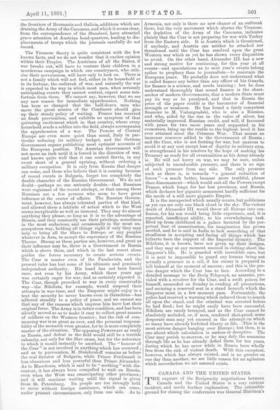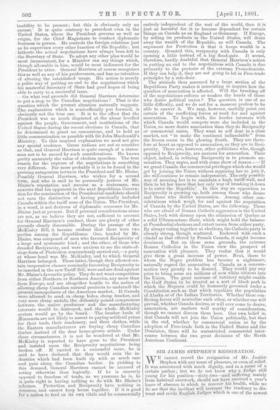CANADA AND THE UNITED STATES. T HE rupture of the Reciprocity
negotiations between Canada and the United States is a very curious incident, and needs further explanation. The ostensible ground for closing the conferences was General Harrison's inability to be present ; but this is obviously only an excuse. It is quite contrary to precedent even in the United States, where the President governs as well as reigns, for the Chief Magistrate to conduct diplomatic business in person. He controls the foreign relations just as he supervises every other function of the Republic ; but hitherto the actual negotiations have always been left to the Secretary of State. To adopt any other plan would be most inconvenient, for a Minister can say things which, though allowable in him, would be most indiscreet for the President to utter, General Harrison of course recognises this as well as any of his predecessors, and has no intention of altering the established usage. His action is merely a. polite way of putting an end to the negotiations which his masterful Secretary of State had good hopes of being able to carry to a successful issue. On what real grounds did General Harrison determine to put a stop to the Canadian negotiations ? That is the question which the present situation naturally suggests. The explanation which is semi-officially put forward, is obviously not the true one. It is to the effect that the President was so much disgusted at the abuse levelled against the people, Government, and institutions of the United States during the recent elections in Canada, that he determined to grant no concessions, and to hold as little communication as possible with Sir John Macdonald's Ministry. To this inspired explanation we need not give any special credence. Great nations are not so sensitive as that, and General Harrison is quite enough of a states- man not to be moved by such considerations. He knows pretty accurately the value of election speeches. The true reason for the rupture of the negotiations is something very different. Far more probably it is to be found in the growing antagonism between the President and Mr. Blaine. Possibly General Harrison, who wishes for a second term, and who is said to be personally jealous of Mr. Blaine's reputation and success as a statesman, was anxious that his opponent in the next Republican Conven- tion for the nomination of the Presidential candidate should not earn the distinction of having practically included Canada within the tariff zone of the Union. The President, in a word, is not desirous of diplomatic successes for Mr. Blaine just at present. But if personal considerations alone are not, as we believe they are not, sufficient to account for General Harrison's conduct, there are plenty of other grounds clearly discernible. During the passage of the McKinley Bill, it became evident that there were two parties among the Republicans. One, headed by Mr. BlaMe, was composed of men who favoured Reciprocity of a large and systematic kind ; and the other, of those who dreaded Reciprocity, and were anxious to see the state-of- siege form of Protection remorselessly- carried out, —a party at whose head was Mr. McKinley, and to which General Harrison belonged. These latter, though they allowed cer- tain inoperative clauses nominally favouring Reciprocity to be inserted in the new Tariff Bill, were and are dead against Mr. Blaine's favourite policy. They do not want competition from either Northern or Southern America, any more than from Europe, and are altogether hostile to the notion of allowing cheap Canadian natural products to undersell the present monopolisers of the American market. If Canada were allowed to send in cheap hides, cheap lumber, and very soon cheap metals, the delicately poised compromise between the native producers and the manufacturing interests would be destroyed, and the whole McKinley system would go by the board. The lumber lords of Minnesota are not likely to assent to paying artificial prices for their tools, their machinery, and their clothes, while the Eastern manufacturers are buying cheap Canadian timber instead of the dear home-grown article. Under these circumstances, it is not be wondered at that Mr. McKinley is reported to have gone to the President and insisted upon the Reciprocity negotiations being broken off. If carried to a successful issue, he is said. to have declared that they would ruin the in- dustries which had been built up with so much care and pain along the Canadian border. In yielding to this demand, General Harrison cannot be accused of acting otherwise than logically. If he is sincerely opposed to freedom of trade, as we presume he is, he is quite right in having nothing to do with Mr. Blaine's schemes. Protection and Reciprocity have nothing in common, and cannot keep house together. If it is good for a nation to feed on its own vitals and be commercially entirely independent of the rest of the world, then it is just as harmful for it to become dependent for certain things on Canada as on England or Germany. If Europe, by selling its products in the United States, will drain away the wealth of the Republic, so will Canada. The argument for Protection is that it keeps wealth in a country. Granted. this, reciprocity with Canada is only opening a little instead of a big flood-gate. It seems, therefore, hardly doubtful that General Harrison's action in putting an. end to the negotiations with Canada is due primarily to the protests of the extreme Protectionists. If they can help it, they are not going to let in Free-trade principles by a side-door. The attitude thus assumed by a large section of the Republican Party makes it interesting to inquire how the question of annexation is affected. Will the breaking off of the negotiations enforce or weaken the hands of those who desire political union ? The question is one of no little difficulty, and we do not for a. moment profess to be able to answer it. We may, however, usefully point out certain of the conflicting forces at work for and against annexation. To begin with, the border interests with which Canada would. compete were she included in the Union, no more desire annexation than they do Reciprocity or commercial union. They want to sell dear in a close market, not "to make the continent indissoluble" from the frozen ocean to the glowing South. They are there- fore at heart as opposed to annexation, as they are to Reci- procity. There are, however, other politicians who, though opposed to Reciprocity, are anxious for annexation. Their object, indeed, in refusing Reciprocity is to promote an- nexation. They argue, and with some show of reason :—' If we grant Canada the commercial privileges which she would. get by joining the Union without requiring her to join. it, she will continue to remain independent. The only possible way of securing her is to maintain a high tariff-wall, and then to let her know that her only way of breaking it down is to enter the Republic.' In this way an opposition to Reciprocity is growing up, both among those who desire and those who dislike annexation. Among other con- siderations which weigh for and against the acquisition of Canada by the United States, are the following. Those who are afraid of Roman Catholic aggression in the United. States, look with dismay upon the admission of Quebec as a solid Ultramontane State, which might hold the balance at Presidential elections and extort terms from either party. By always voting together at elections, the Catholic party is already strong, though scattered. Endowed with such a citadel as that offered by French Canada, it might become dominant. But on these same grounds, the extreme Roman Catholics in the Union view the prospect of annexation with pleasure. They realise that it would give them a great increase of power. Next, those to whom the Negro problem has become a, nightmare, naturally regard the annexation of Canada as a consum- mation very greatly to be desired. They would pay any price to bring some six millions of new white citizens into the Union. The great increase of territory might enable the Gulf States to be treated as a sort of black park in which the Negroes could be humanely governed. under a Constitution such as that which regulates the population of Alaska or of the Indian Territories. Whether these con- flicting forces will neutralise each other, or whether one will prevail, whether Canada desires, or will ever come to desire, annexation, are matters well worthy of consideration, though we cannot discuss them here. Our own belief is, that Canada will not join the Union politically, but that in the end, whether by commercial union or by the adoption of Free-trade both in the United. States and. the Dominion, there will be unrestricted commercial inter- course between the two great divisions of the North American Continent.



































 Previous page
Previous page